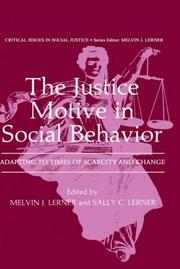| Listing 1 - 4 of 4 |
Sort by
|

ISBN: 0521431999 0521089980 0511552068 Year: 1993 Publisher: Cambridge : Cambridge University Press,
Abstract | Keywords | Export | Availability | Bookmark
 Loading...
Loading...Choose an application
- Reference Manager
- EndNote
- RefWorks (Direct export to RefWorks)
Justice, equity, and fairness are central concerns of everyday life, whether we are assessing the fairness of individual acts, social programmes, or institutional policies. This book explores how the distribution of costs and benefits determine our intuition about fairness and why individual behaviour sometimes deviates from normative theories of justice. To make any comparison, one must first state how fair distributions of resources or burdens should be made. Here, competing theories, such as utilitarianism and economic efficiency, are discussed. The chapters cover many topics including an investigation of various rules and heuristics that people use to make fair distributions; the motivation for people to conform to rules of fairness even when they conflict with self-interest; differences between the views of liberals and conservatives; societal rules for the distribution or allocation of critical or scarce resources; and implications for public policy. This mixture of theoretical and applied perspectives provides a balanced look at the psychology of justice.
Social justice --- Psychological aspects --- Decision making --- Social justice - Psychological aspects. --- Decision-making - Psychological aspects. --- Health Sciences --- Psychiatry & Psychology --- Psychological aspects. --- Equality --- Justice

ISBN: 0306404958 9780306404955 Year: 1980 Publisher: New York (N.Y.): Plenum,
Abstract | Keywords | Export | Availability | Bookmark
 Loading...
Loading...Choose an application
- Reference Manager
- EndNote
- RefWorks (Direct export to RefWorks)
Political philosophy. Social philosophy --- Social psychology --- Social justice --- Belief and doubt --- Psychological aspects --- -Equality --- Justice --- Conviction --- Doubt --- Consciousness --- Credulity --- Emotions --- Knowledge, Theory of --- Philosophy --- Psychology --- Religion --- Will --- Agnosticism --- Rationalism --- Skepticism --- Belief and doubt. --- Psychological aspects. --- -Psychological aspects --- Equality --- Social justice - Psychological aspects

ISBN: 0306406756 148990431X 1489904298 9780306406751 Year: 1981 Publisher: New York (N.Y.): Plenum
Abstract | Keywords | Export | Availability | Bookmark
 Loading...
Loading...Choose an application
- Reference Manager
- EndNote
- RefWorks (Direct export to RefWorks)
Social change --- Sociology of law --- Social psychology --- Social justice --- Adaptability (Psychology) --- Psychological aspects --- 159.922.2 --- -Social change --- -Social justice --- -Equality --- Justice --- Change, Social --- Cultural change --- Cultural transformation --- Societal change --- Socio-cultural change --- Social history --- Social evolution --- Adaptation (Psychology) --- Adaptive behavior --- Flexibility (Psychology) --- Malleability (Psychology) --- Personality --- Adjustment (Psychology) --- Ecologische psychologie --- Congresses --- -Congresses --- -Ecologische psychologie --- 159.922.2 Ecologische psychologie --- -159.922.2 Ecologische psychologie --- Equality --- Psychological aspects&delete& --- Social justice - Psychological aspects - Congresses --- Social change - Psychological aspects - Congresses --- Adaptability (Psychology) - Congresses

ISBN: 1280207221 9786610207220 0306471698 0306461552 Year: 1999 Volume: *2 Publisher: New York, NY : Springer US : Imprint: Springer,
Abstract | Keywords | Export | Availability | Bookmark
 Loading...
Loading...Choose an application
- Reference Manager
- EndNote
- RefWorks (Direct export to RefWorks)
When we say that a person deserves a positive or negative outcome, we are making a judgment that is influenced by a number ofvariables. We would certainly take into account whether the person was resp- siblefortheoutcomeorwhethertheoutcomecouldbeattributedtoother sources. We would also consider whether the actions that led to the positive or negative outcome were actions that we would value or - tionsthatwouldmeetwithourdisapproval.Wemightalsobeinfluenced by the person’s own positive or negative characteristics, by ourkno- edgeofwhatkinds ofgroups orsocialcategoriesthepersonbelongedto, and by whether we like or dislike the person. Information about these differentvariableshastobe consideredandintegratedin someway, and our judgment of deservingness follows that psychological process, a process that involves the cognitive-affective system. Values, Achievements, and Justice is about deservingness and about the variables that affect the judgments we make. I use the term “dese- ingness” although I could equally have referred to “deservedness” or “desert.” The terms are all virtually equivalent in meaning, although dictionaries may separate them by using fine distinctions. I assume that the sorts of variables I have just described will affect ourjudgments of deservingness, and I further assume that a judgment of deservingness is most likely to occur when these variables fit together in a consistent, harmonious, and balanced way.
Deservingness. --- Judgment. --- Social justice -- Psychological aspects. --- Judgment --- Social justice --- Psychology --- Social Sciences --- Psychological aspects --- Psychological aspects. --- Deservingness --- Judgement --- Jugement --- Oordeel --- #PBIB:2001.2 --- Psychology. --- Personality. --- Social psychology. --- Cognitive psychology. --- Personality and Social Psychology. --- Cognitive Psychology. --- Criminology and Criminal Justice, general. --- Consciousness. --- Criminology. --- Equality --- Justice --- Knowledge, Theory of --- Language and languages --- Thought and thinking --- Wisdom --- Crime --- Social sciences --- Criminals --- Psychology, Cognitive --- Cognitive science --- Mass psychology --- Psychology, Social --- Human ecology --- Social groups --- Sociology --- Personal identity --- Personality psychology --- Personality theory --- Personality traits --- Personology --- Traits, Personality --- Individuality --- Persons --- Self --- Temperament --- Study and teaching
| Listing 1 - 4 of 4 |
Sort by
|

 Search
Search Feedback
Feedback About UniCat
About UniCat  Help
Help News
News